In the final days before my family and I shifted our luggage and lives to France this summer – at the very time our Toronto home was a packing pigsty, and as we trod heartily into our 10-day, do-or-die window for Yoko’s persnickety paperwork – I received a most intriguing email in my French Lessons inbox:
I came across your website whilst searching for any clues about a property . . . that was my mother’s childhood home. She lived in Antibes from when she was born (1923) until the war, when the whole family fled back to England. . . .
Anthea and her husband would visit the Côte d’Azur shortly. She’d send a photo of her mother’s former home. Was it was a match?
From her initial description, I already knew the answer. For years I’ve worked to uncover the story of Bellevue, our home in Antibes:
- I’ve spent countless, very un-Côte-d’Azur-like hours inside les archives municipales, trying to squeeze facts out of a dry sponge – but eventually there’d be a drop, a throw-your-fist-in-the-air celebration, and renewed drive to return to the fragile volumes that wafted of grassy, vanilla-tinged must.
- . . . and unwittingly found his exquisite wife, Arlette, a former resident of our home until it was requisitioned by the occupying Italians in World War II.
- Our local doctor unearthed the robust Jean-Claude, a former property notaire and, intriguingly, Bellevue’s immediate post-war occupant . . .
- . . . and our osteopath friend discovered the willowy Geneviève, another former resident from the 70s.
Other connections have wiggled into our lives through the Cannes-Mougins Golf Club and the Monaco Grand Prix. Even more surprisingly, an elderly woman still holding one of Bellevue’s original, eight-inch, iron keys let herself into the property during our renovations. Once an owner, always an owner, it seems.
In short, over the course of the decade that my family has inhabited this limestone-and-stucco villa by the sea, Bellevue has taken on a life of her own.
Anthea’s photo was a match. One morning a couple weeks ago, she and her husband Chris rang at the gate.
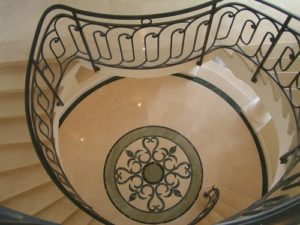
An unusual and instant connection arises when you meet someone with a mutual interest – particularly when that something is as specific as your home. You both understand that the building is more than a bunch of stones, wires and pipes knitted together in a certain way. The place is somehow the keeper of the past, of all that unfurled on this particular patch of earth. It is the safe walls in which lives were created and shaped and transformed.
Anthea and I shared this attachment. She was in her late-fifties and, I quickly learned, a keen supporter of Airbnb, and one who was untroubled by an imminent, four-hour drive through France’s convoluted interior to the town of Briançon.
We entered Bellevue through her massive, walnut door – the one that retains that grand, old, iron lock – and wandered through the main floor while considering the function of each room – today and in times past, according to the lore I’ve gathered. Today’s dining room was the study in past generations; the living room was the dining room; the study was a cold-and-damp living room.
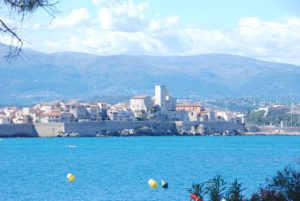
We moved upstairs and downstairs and into the garden. Chris, too, seemed eager to glimpse the childhood of his late mother-in-law. Cycling through my brain as we moved through the house together was a phrase I stumbled on earlier this summer in Provence, 1970. The author, Luke Barr, was recalling the moment he revisited the beloved home of his great-aunt: the mood was “strangely different,” he wrote, “yet somehow exactly the same, haunted by time and memory.”
I hoped to create the same atmosphere for Anthea and Chris. As I shared the assembled story of Bellevue, the couple expanded my repertoire, stitching the earliest threads yet into the fabric of this old house.
Anthea’s mother, Margaret Anderson, lived at Bellevue in her youth. Her family had taken a long lease.
They would’ve leased the property from Edouard Muterse, I said, the well-connected local man who built Bellevue for rental income around 1930. These members of Anthea’s family were quite possibly the first occupants of our seaside home.
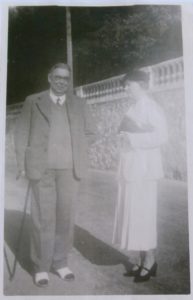
Margaret lived most of her days here with her twin brother Charles, their older sister (by nine years) Cynthia, and their mother Mercia (née Clements). They could’ve lived almost anywhere in the world, Anthea explained. The family was English, but Anthea’s grandfather Henry Anderson was an engineer in India. While he spent his days abroad, the family chose to live in the Côte d’Azur. The twins were born here. They stayed in France until they were 16 years old.
The family employed a governor for the children’s schooling, but Margaret insisted this woman used to “drink dirty water.”
Alcohol, Anthea translated. It made her question the quality of her mother’s education.
Difficult governors weren’t so abnormal at Bellevue during that era, I said. Arlette, the dainty woman whose family occupied Bellevue from 1939 – the same year Margaret and her family left France – also had a troublesome governor as a child. When Arlette first visited Philippe, Lolo and me at Bellevue, she let her husband Jean, the local storyteller, do most of the talking. She was a reserved woman by nature, and surely a sudden return to the walls of her childhood was overwhelming. But one of Arlette’s first memories here, revived as she peered into Bellevue’s circular stairwell, was that of her governor’s heavy hand.
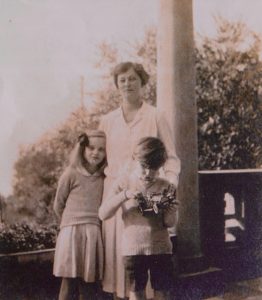
At last Anthea, Chris and I gathered at the long table on Bellevue’s terrasse, overlooking the very view of Antibes’ old town that all former occupants would’ve enjoyed. Eleven-year-old Lolo joined us; she picked the latest figs from the figuier in the garden and insisted on sharing them out over cups of tea.
Anthea opened the blue legal file she’d been carrying through the house. Before leaving England, she’d scoured her family’s albums. Now she presented copies of a couple dozen photos:
- Here was Henry, the engineer and early lessee of Bellevue, on a visit back from India. A robust figure leaned against a classic 1930s-style, open-air car. His three-piece suit, round wire glasses, and neat side part in his thick, dark hair conveyed confidence.
- Here beside Henry was Mercia, dressed in a smart white skirt and blazer; black, high-heeled Mary Janes; and a black cloche hat. In her hand was a matching handbag. While Henry stared gamely into the camera, Mercia appeared enigmatic, offering only a neat profile to the lens. She donned the slightest smile as she gazed into the distance, focusing neither on her husband nor on the photographer.
- Here were the young, primary school-aged twins, dressed in woolen sweaters, knee socks, and a casual skirt for Margaret and shorts for Charles. The boy gazed down at a toy car in his hands. It was a miniature version of his father’s car.
Charles’ interest in this toy made sense, I said. Cars were becoming increasingly popular in Antibes in the 1930s.
- Here was Margaret, older this time with her hair in long braids. Her white cotton dress shone in the same sunlight that highlighted patches of an ivy-covered, stucco wall behind her. By the deco ironwork, the wall could’ve belonged to Bellevue. In the photo Margaret kneeled proudly beside a dog.
What was the dog’s name? Lolo, my animal-lover, asked.
No one remembers, Anthea said. But the family also had a goose. She was called Frigoline!
The history of Bellevue’s former goose also was a mystery. Perhaps she was a pet. Or she could well have been a guard, Chris suggested. Geese are very noisy, he said, and in the past they were used as guards.
My brain made connections again, this time to the first bit of advice we heard from Michel, a frequent visitor to Bellevue in the 1960s and 70s, and the contact we sourced through the Monaco Grand Prix. Shortly after Philippe, Lolo and I moved into this house, the alpha male popped around in his Monaco-plated 911 Carrera S with his statuesque girlfriend. We shared the briefest preliminary pleasantries and then Michel warned: Make sure you have a good alarm system.
Security, it seems, always has been an issue.
Margaret and her family lived in France, and possibly in Bellevue, until 1939, when the war began. The twins were put on a train back to England, and their parents and older sister followed by ship, a vessel that was heavily crowded and overloaded. In her later years, Margaret would remain sympathetic to war refugees.
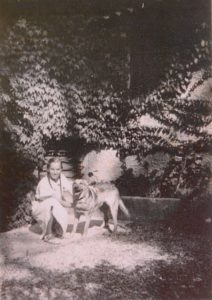
In Anthea and Chris’ short visit, we may have met – at least through photos and shared memory – Bellevue’s first occupants. Perhaps Margaret and her family were Bellevue’s Chapter 1. Chapter 2, then, would’ve been dainty Arlette, who moved in as a child when her family fled the war in the north of France; they opted for the southern free zone until it, too, was no longer free.
After a grisly and opaque Chapter 3, a period consumed by Italian and German occupations of Bellevue, Chapter 4 would’ve focused on the ex-notaire Jean-Claude, and more precisely, his grandfather. After moving into our home, the man positioned himself on our seaside terrasse, revolver in his hands, and monitored German prisoners of war as they demined Bellevue’s garden.
The home soon passed through the estate of her founder, Edouard Muterse, to his niece, who after several requests eventually let go of the property. A long Chapter 5 later, a Belgian family bought Bellevue and welcomed alpha male Michel as their guest for several summers in the late-sixties and early-seventies – on the understanding that he re-varnished each of Bellevue’s ten wooden doors each year.
Willowy Geneviève’s family rented Bellevue for a few summers in what would be Chapter 6, and eventually the property passed to a Parisian doctor in Chapter 7. Surely it was his widow who let herself into Bellevue with the old, iron key.
A couple decades later, far as I can tell, a dot-commer Dane bought Bellevue, thus opening Chapter 8. Shortly he went bankrupt; as he looked for his feet again, squads of squatters became Bellevue’s next residents. Chapter 9. Eventually the Dane sold to a British investor, who Philippe and I met in Chapter 10, a period that began one fateful day in October 2005.
And so we gather the chapters of Bellevue, with resonant mercis to les archives municipales, Jean, Arlette, Jean-Claude, Michel, Geneviève – and now to Anthea. The past has come to life through a variety of unexpected avenues.
Finding new stories becomes more and more rare with each discovery – it’s a mathematical certainty – but clearly some holes remain in the book of Bellevue. I guard an ardent hope: that the flow of these unexpected messengers won’t dry up anytime soon.

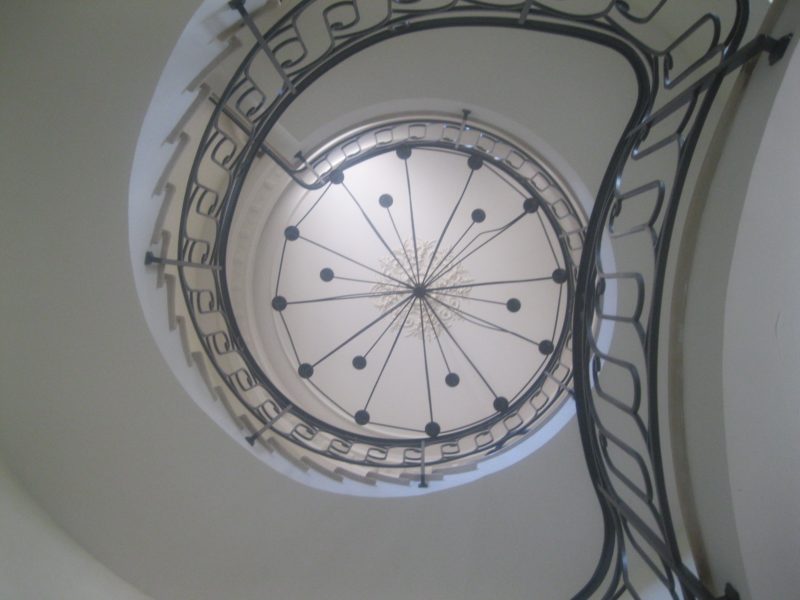
Love, love, love reading about Bellevue! Miss seeing you in person! Love to all! Bisous!, Cy xx
Merci, Cy! And yes, moi aussi. xoj
What a fascinating history of your house — well done with your sleuthing!
You’ve got the outline of a pretty interesting novel here Jemma!
Merci, Craig – and it’s all TRUE! Now I have to find more time…
Another very interesting text, Jemma. BRAVO.
Over the past week, when I was thinking of the French Riviera, like everybody in the world were, for the sad reason we know, I was remembering that on July 14, 2013, I was in Nice with two Canadian business partners and friends for an afternoon meeting with Philippe.
After the meeting, Philippe went back to Bellevue and my two partners and I went for a quick shower and then a great dinner in a charming restaurant on La Rue de France, following which, we went walking on the beautiful Promenade des Anglais and enjoy the fireworks, little music shows and happiness of the thousands of people there.
And I decided that next year, I’ll do the same, would it only be to prove that those crazy barbarians will not win by changing our way of life.
Vive la Côte d’Azur and enjoy your summer.
You have great style, Andy. Thank you for this comment. Let the world emulate your strength!
Arlette et Jean ont ont ouvert La Bastide du Bosquet aux clients comme chambre d’hote depuis 1993, n’est pas? Leur maison a l’air charmant!
Website ici: http://www.lebosquet06.com/index.html
C’est ça, Kirk! Ils sont exactement ça: charmants! j
My dear, this was so fascinating, I couldn’t stop reading even though I knew I had an appointment, You make me think of books I read as a young child about Nancy Drew and her super-sleuthing! You are a skilled writer and I really enjoy these life stories!
Thank you so much, Mary! You write me the most encouraging comments! xoj
Thanks for sharing this delightful visit with us. May the rest of your summer be filled with equally pleasant surprises. Mark
Gros merci, Mark. Pleasant surprises: It seems that’s what France really needs at this moment.
A fascinating history revealed through your diligent and persistent effort. Well done.
It is amazing – the way you have pieced together the former residents of your house. I think you may eventually have it all put together. Looking forward to learning about another former resident.
Past meets present at last, thank you for sharing this fascinating story with us.
Fascinating reading of the former occupants! It does merit writing a book or even a movie! I live in an old house in NW Indiana, which was built by Swiss immigrants. It feels very European, with nooks and crannies and built-ins. I often imagine what the original owners were like.
Loved, absolutely loved, receiving your comment, and I must say the timing was serendipitous. I’m plunging into my notes related to the history of our house (and beyond), and I’m having a tough time making any sense of them in the context of the present-day book I’m writing based on these blogs. When thoughts began to hover about giving up on this angle entirely, I received your encouraging comment – out of the blue! Thank you. And it sounds as though you could have your own stories to pursue?
You’re most welcome! I have the original abstract papers, bound as a volume (big & floppy!). All of the owners are listed from the very beginning of the first sale of property dating back to about 1800 I suppose. I need to research more! I did remodel a bathroom and found a shelf unit embedded in a wall and children’s school papers still laying there. And a postcard dated 1911!
You have a project for yourself! Please keep us in the loop if you do something with it!
We so wish our mother was still alive, she would have loved reading your entry
about my sister Anthea & Chris’s visit to see you at her childhood home. Spell binding reading & thank you , so much for your respectful guardianship of such a magical place, even though we are no longer a part of this place, I now completely understand why she sometimes used to gaze out into space, as though she was looking back to a magical lost world ..when times got difficult. She became a senior nurse, & after the war, spent 25 years working in Africa, she still inspires us of course every day.
Dear Isobel,
Merci – merci bien – for your heartfelt message. I’m really delighted you’ve found this information and that it was meaningful in some way to connect the dots of your mother’s earlier days. It has been a pleasure and a privilege to get to know this home, and I, too, have found myself lost in its magic. Thank you for sharing a sketch of your mother’s life; her years on this French terrain certainly set her up for meaningful contributions. I appreciate that you took the time to be in touch.